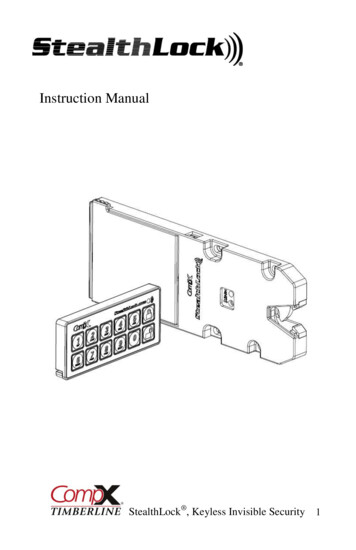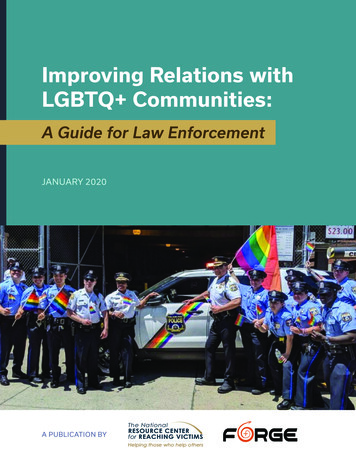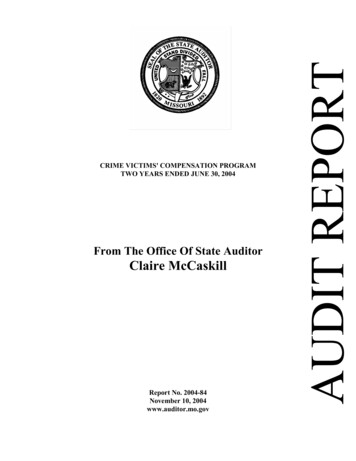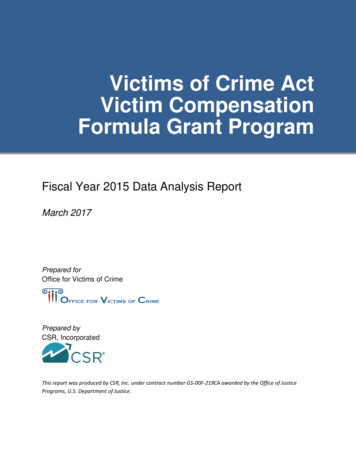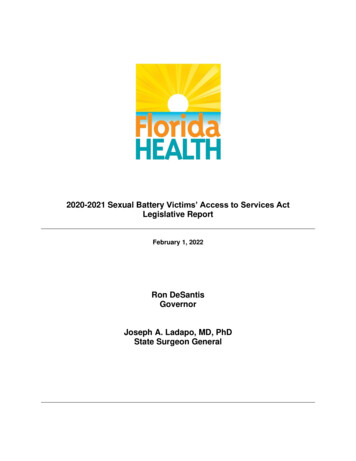
Transcription
2020-2021 Sexual Battery Victims’ Access to Services ActLegislative ReportFebruary 1, 2022Ron DeSantisGovernorJoseph A. Ladapo, MD, PhDState Surgeon General
Table of ContentsExecutive Summary 1The Scope and Impact of Sexual Violence . .1The Response to Sexual Violence: Rape Crisis Services . .2Sexual Battery Services . .2Service Standards and Certification of Rape Crisis Centers . . . .3Rape Crisis Program Trust Fund Allocations by Program . . .3Other Funding Sources for Rape Crisis Centers . .5Financial Compliance .5References .6
Report to the Florida Legislature:The Sexual Battery Victims’ Access to Services Act,The Rape Crisis Program Trust Fund, andRape Crisis Services in FloridaEXECUTIVE SUMMARYThe Florida Department of Health (Department), Violence and Injury Prevention Section (VIPS)is pleased to provide the Florida Legislature with the 2020-2021 Rape Crisis Program TrustFund Legislative Report, as mandated by section 794.055, Florida Statutes.In 2003, the Florida Legislature created “The Sexual Battery Victims’ Access to Services Act”(the Act) and the Rape Crisis Program Trust Fund (RCPTF) within the Department. The Actcreated a funding system for the distribution of monies generated by a 151 fine assessed onoffenders convicted of sexual battery and other offenses. While the clerk of the court retains 1of the fine as a service fee, 150 goes to the RCPTF. This Act also requires the Department tocontract with a statewide, nonprofit association to distribute these funds for the provision ofsexual battery recovery services. The Department contracts with the Florida Council AgainstSexual Violence, Inc. (FCASV), a statewide nonprofit organization committed to assisting victimsand survivors of sexual violence and the rape crisis centers that serve them. FCASVsubcontracts with rape crisis centers throughout the state to serve victims.From September 2003 to June 2021, county clerks deposited 27,606,121 into the trust fund.Rape Crisis Program Trust Fund monies are awarded annually to FCASV. In fiscal year 20202021, the FCASV received 250,150 to provide statewide initiatives in support of victims, while31 certified rape crisis centers received 1,417,514 for a total annual distribution amount of 1,667,664 to provide victims with a variety of sexual battery recovery services. Fundingallocation for each rape crisis center is based on population data from the U.S. Census.THE SCOPE AND IMPACT OF SEXUAL VIOLENCEIn calendar year 2020, the Florida Statewide Violent Crime by Offense Report, produced by theFlorida Department of Law Enforcement, identified 7,650 reported forcible sex offenses and4,182 arrests. The consequences of sexual violence can include physical injuries such asbruising or cuts, or psychological issues, such as anxiety, depression, or suicidal thoughts(Basile & Smith, 2011). The Centers for Disease Control and Prevention reports that victims ofsexual violence are also more likely to engage in negative health behaviors than those whohave not experienced sexual violence. These behaviors may include a dependency on alcohol,drugs, and risky sexual activity.As noted in the Centers for Disease Control and Prevention’s STOP SV Technical Package,sexual violence is highly prevalent. Approximately 1 in 5 women (19.3%) in the United Stateshave experienced rape or attempted rape in their lifetime and 43.9% have experienced otherforms of sexual violence (Basile et al., 2016). For instance, 12.5% have experienced sexualcoercion, 27.3% have experienced unwanted sexual contact, and 32.1% have experienced noncontact unwanted sexual experiences (Breiding et al., 2014). The National Intimate Partner andSexual Violence Survey (NISVS) indicates that women carry the greatest burden of sexualviolence over their lifetimes, but men are also impacted. Approximately 1 in 15 men (6.7%) havebeen made to penetrate someone at some point during their lives, 5.8% have experienced-1-
sexual coercion, 10.8% have experienced unwanted sexual contact, and 13.3% haveexperienced non-contact unwanted sexual experiences (Black et al. 2011).THE RESPONSE TO SEXUAL VIOLENCE: RAPE CRISIS SERVICESDuring the 2020-2021 fiscal year, advocates in 31 certified rape crisis centers across the stateprovided an immediate and ongoing response to sexual violence victims. Certified rape crisiscenters serve recent adult and adolescent rape victims and adult male and female survivors ofchildhood sexual abuse. Rape crisis centers provide in-person crisis intervention and/or helplineservices, advocacy and accompaniment, and information and referral 24 hours a day, 7 days aweek in an attempt to meet victims’ needs.SEXUAL BATTERY SERVICESIn fiscal year 2020-2021, 1,570 new and ongoing primary and secondary victims receivedservices. Certified rape crisis centers received 26,487 helpline calls related to sexual battery.The following details the sexual battery recovery services provided:Type of ServiceAdvocacy and AccompanimentCrisis InterventionInformation and ReferralsForensic ExamsSupport GroupTherapyTotalNumber of Services3,6312,9257,6377441633815,021Sexual Battery Services by Fiscal YearTherapySupport GroupForensic ExamsInformation and ReferralsCrisis InterventionAdvocacy and Accompaniment-2,0004,000FY 2019-206,0008,00010,000FY 2020-21Source: Florida Department of Health Sexual Violence Data Registry.-2-12,000
SERVICE STANDARDS AND CERTIFICATION OF RAPE CRISIS CENTERSFCASV is responsible for service standards and the certification process for Florida’s rape crisiscenters. Service standards and certification are based on the following: A broad array of high-quality, sexual violence services must exist in every community.Victims are best served through sexual violence services provided in the context of acoordinated, collaborative, and multidisciplinary approach including medical/forensicproviders, advocates, criminal justice professionals, and other social service providers.All service providers must have victim empowerment as the cornerstone of servicedelivery.Independent on-site reviews of each rape crisis center are conducted every other year to ensurecompliance with the service standards and the certification process.RCPTF ALLOCATIONS BY CENTER7/1/2020 - 6/30/2021Certified Rape Crisis Centers in Florida(City)Abuse Counseling and Treatment, Inc.(Fort Myers)Alachua County Victim Services & Rape CrisisCenter (Gainesville)Another Way, Inc.(Bronson)Broward County Sexual Battery TreatmentCenter (Fort Lauderdale)Center for Abuse and Rape Emergencies, Inc.(Punta Gorda)Centerstone of Florida, Inc. (Bradenton)(formerly Manatee Glens)Creative Services, Inc.(Ocala)The Crisis Center of Tampa Bay, Inc.(Tampa)Family Life Center, Inc.(Bunnell)Gulf Coast Children’s Advocacy Center, Inc.(Panama City)Haven of Lake and Sumter Counties, Inc.(Leesburg)Lakeview Center, Inc.(Pensacola)Mujeres Unidas en Justicia, Educación yReforma (M.U.J.E.R.), Inc.(Women United in Justice, Education, andReform) (Homestead)Counties ServedTotalAwardLee, Hendry, Glades 58,675Alachua, Bradford, Union 45,791Levy, Gilchrist, Dixie, Hamilton,Lafayette, Suwannee, Columbia 94,751Broward 73,913Charlotte 16,705Manatee 21,697Marion 23,381Hillsborough 54,657Flagler 14,764Bay, Calhoun, Gulf, Holmes,Jackson, Washington 83,288Lake, Sumter 36,982Escambia, Santa Rosa 37,433South Miami-Dade 30,095-3-
Certified Rape Crisis Centers in Florida(City)Counties ServedTotalAwardPalm Beach County Victim Services(West Palm Beach)Peace River Center for Personal Development,Inc. (Lakeland)Project Help, Inc.(Naples)Palm Beach 58,410Hardee, Highlands, Polk 61,778Collier 23,808Putnam County Health Department(Palatka)PutnamAwarded by Department ofHealth – not FCASV 22,000Quigley House, Inc.(Orange Park)Clay 17,257Refuge House, Inc.(Tallahassee)Franklin, Gadsden, Jefferson,Leon, Liberty, Madison, Taylor,Wakulla 111,767Miami-Dade 72,738DeSoto, Sarasota 36,936St. Johns 17,223Hernando 16,345Indian River, Martin,Okeechobee, St. Lucie 63,122Okaloosa, Walton 32,317Brevard 29,676Volusia 28,055Pinellas 42,714Pasco 26,600Orange, Osceola, Seminole 95,223Baker, Duval, Nassau 69,413Roxcy Bolton Rape Treatment Center/JacksonMemorial Hospital, Inc. (Miami-Dade)Safe Place and Rape Crisis Center, Inc.(Sarasota)Safety Shelter of St. Johns County, Inc. dbaBetty Griffin Center(St. Augustine)Salvare, Inc. dba Dawn Center of HernandoCounty (Spring Hill)Sexual Battery Assistance ProgramState Attorney’s Office,19th Circuit(Fort Pierce)Shelter House, Inc.(Fort Walton Beach)South Brevard Women’s Center, Inc.(Melbourne)SMA Healthcare, Inc.(Daytona Beach)Suncoast Center, Inc. dba Family ServiceCenters (Clearwater)Sunrise of Pasco County, Inc.(Dade City)Victim Service Center of Central Florida, Inc.(Orlando)Women's Center of Jacksonville, Inc.(Jacksonville)TOTAL-4- 1,417,514
OTHER FUNDING SOURCES FOR RAPE CRISIS CENTERSGeneral Revenue: In response to the overwhelming need for rape crisis services in Florida,Governor Ron DeSantis continued to recommend, and the Florida Legislature approved, 2,500,000 in recurring general revenue to fund rape crisis centers, bringing the state’s totalgeneral revenue appropriation to 3,000,000. The funds appropriated for sexual batteryrecovery services include 500,000 provided through the Office of the Attorney General and 2,500,000 through the Department of Health to FCASV for distribution to certified rape crisiscenters for the provision of services to victims of sexual battery.Victims of Crime Act (Federal): The Victims of Crime Act, passed in 1986 and reauthorized in2013, supports many direct service programs at rape crisis centers. This fees-and-fines-basedfunding is from the U.S. Department of Justice and is administered in Florida through the Officeof the Attorney General.Violence Against Women Act (Federal): The Violence Against Women and Department ofJustice Reauthorization Act has improved the systemic response to sexual violence victims byfunding training and technical assistance to first responders at rape crisis centers, lawenforcement agencies staff, and allied professionals to improve the provision of sexual batteryrecovery services for sexual battery victims. The Sexual Assault Services Formula Grant Program (SASP) funding is passed throughfrom the Department to FCASV for distribution via a competitive grant process to eightcertified rape crisis centers. During 2020-21, FCASV received Services-Training-Officers-Prosecutors (STOP) fundsto improve the provision of sexual battery recovery services for sexual battery victims.To achieve this, FCASV provided training and technical assistance to first respondersincluding law enforcement agencies and allied professionals on protocols, resources,and trauma-informed responses. As of 2021, this funding will be administered by theDepartment of Children and Families.Injury Prevention and Control Research and State and Community Based Programs(Federal) and Preventive Health and Health Services Block Grant (Federal): Thesesources support 24 agencies applying the Centers for Disease Control and Prevention STOPSV Technical Package for rape prevention. Twelve competitively awarded local sites implementcommunity-level strategies, using the best available evidence to address violence across thesocio-ecological model. This includes promoting social norms that protect against violence;teaching skills to prevent sexual violence; providing opportunities to empower and support girlsand women; and creating protective environments through policies, programs, and practice.Additionally, twelve rape crisis centers work to: 1) develop or expand their partnership withcounty health departments to elevate sexual violence and human trafficking in the CommunityHealth Improvement Plan (CHIP), 2) develop referral protocols with county health departmentsfor clients who disclose sexual violence, and 3) create protective environments by conductingsocial marketing campaigns addressing community-level risks through environmentalapproaches.FINANCIAL COMPLIANCEAs required by The Sexual Battery Victims’ Access to Services Act, the Department ensuresthat funds allocated through the trust fund are expended in a manner that is consistent with theprovisions of the Act. The VIPS ensures that no more than 15 percent of the funds are used by-5-
FCASV for administrative costs and no more than 5 percent of the funds are used by theDepartment for administrative costs. Additionally, FCASV submits quarterly financialexpenditure reports and an annual audit to the Department for review.REFERENCESBasile, K.C., DeGue, S., Jones, K., Freire, K., Dills, J., Smith, S.G., & Raiford, J.L. (2016).STOP SV: A Technical Package to Prevent Sexual Violence. Atlanta, GA: National Center forInjury Prevention and Control, Centers for Disease Control and Prevention.Basile, K.C. and Smith, S.G. (2011). Sexual Violence Victimization of Women: Prevalence,Characteristics, and the Role of Public Health and Prevention. American Journal of LifestyleMedicine (5): 407-417.Black, M.C., Basile, K.C., Breiding, M.J., Smith, S.G., Walters, M.L., Merrick, M.T.,Chen, J., & Stevens, M.R. (2011). The National Intimate Partner and SexualViolence Survey (NISVS): 2010 Summary Report. Atlanta, GA: National Centerfor Injury Prevention and Control, Centers for Disease Control and Prevention.Breiding, M.J., Smith, S.G., Basile, K.C., Walters, M.L., Chen, J., & Merrick, M.T. (2014).Prevalence and characteristics of sexual violence, stalking, and intimate partner violencevictimization–National Intimate Partner and Sexual Violence Survey, United States, 2011.MMWR Surveillance Summaries, 63(8), 1-18.Florida Statistical Analysis Center. (2020). Florida Uniform Crime Report, 2020 [Annual report].Florida Department of Law Enforcement.-6-
Palm Beach County Victim Services (West Palm Beach) Palm Beach 58,410 Peace River Center for Personal Development, Inc. (Lakeland) Hardee, Highlands, Polk 61,778 Project Help, Inc. (Naples) Collier 23,808 Putnam County Health Department (Palatka) Putnam Awarded by Department of Health - not FCASV 22,000 Quigley House, Inc. (Orange Park)

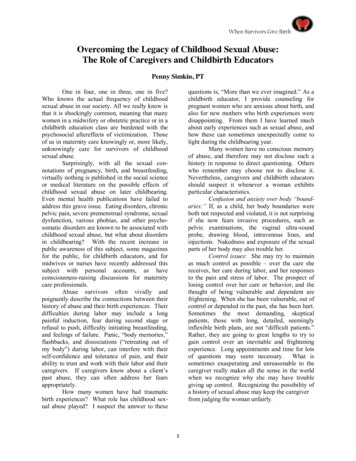
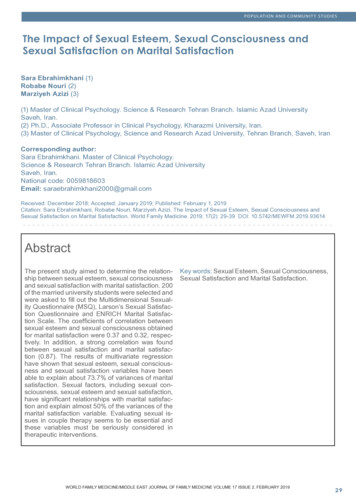
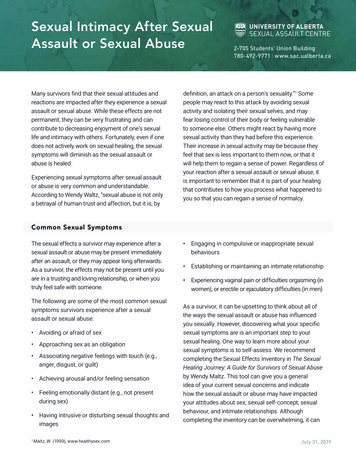

![Smarter Battery Crack [2022-Latest]](/img/13/eliamari.jpg)

